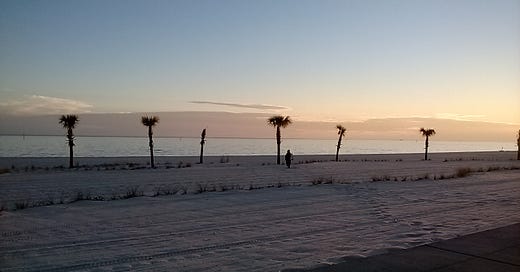Remember
May 11, 2010
Oil Spill Article #3
There are so many things that I can watch but not change. I am experiencing such grief over this oil spill (BP Oil Spill in Gulf of Mexico). I am watching the oil moving towards the gorgeous marsh land and the barrier islands and I want to be omnipotent. I want arms to reach out and hold the oil away. I want a giant vacuum cleaner that will suck the oil off the water.
I was so hopeful that at least one of the bizarre ideas suggested by BP Petroleum would work. It’s clear now that there will be no miracle solution. We can see for sure that there are those who are willing to put our planet at risk without any knowledge of how they will mitigate possible damage.
I suppose everyone can argue that we need the oil and that it was done, not for greed, but out of patriotism, to end our dependence on foreign oil. After all, I am guilty too, the queen of central heating. I have not offered to give up my personal comfort. However, apparently, we are playing with technologies we are not in control of.
Will a nuclear accident be next? How many birds will die? How long will it take for the beaches and marshes to be free of oil? How long before the sea recovers and the fish and the shellfish? Will it ever recover? I thought the planet would be ruined at some distant time in the future. We have been watching the destruction in slo-mo, but it wasn’t like this.
All day, whatever I do, in the back of my mind I am following the progress of the oil, wishing this would be the moment the oil stopped flowing into the Gulf of Mexico, and each day when the day is through the potential for carnage is worse.
November 2014
In early November of 2014 I went with my sisters to Gulfport, Mississippi. This small, lovely place on the Gulf of Mexico seemed to have recovered from the BP oil spill of 2010, but as we traveled through this town and the area around it people who owned restaurants and small businesses wanted to tell the story of how their personal fortunes were affected by the oil spill, and even more so how they were affected by Katrina.
Along the beach road in Gulfport is a line of sculptures of sea birds and pelicans which residents told us used to be a line of live oaks. These leafy symbols of southern grace were all chopped off and laid low by Katrina in 2005. The sculptures are beautiful, but I bet those live oaks were even more gorgeous, lending shade and height to a beachfront that seems almost barren. Of course, it has the appeal of any place where ocean meets sand and horizons are endless, but with those live oaks that beach must have been a knock-out.
Restaurants showed us what their establishments had looked like before Katrina and after Katrina. Most had to demolish the businesses built over a lifetime, but they were proud of their new facilities. One thing Katrina could not touch was the cook’s recipes, the touches they used to personalize their food and make them establishments that people couldn’t wait to eat at again. Then, in 2010 along came the BP Oil Spill and this took another bite out of these businessmen and women, these families, because for quite a while seafood was hard to get and customers did not trust it to be uncontaminated. Tourist towns became quiet backwaters for a few years hurting all the local shop owners.
We made day trips into New Orleans which seemed totally recovered from both Katrina and the oil spill, but we stayed mostly in tourist areas which were not as hard hit. Shop and restaurant owners did not visit with us and tell their stories in the same way that entrepreneurs did in Gulfport, a much more intimate place.
Katrina was a natural disaster and there have been other hurricanes since then. Hurricanes seem attracted to that Louisiana Delta and nearby coastal area as if it were a bull’s eye on a target. Are storms fiercer because of global warming? There is not a clear answer about this, although given the rising of seas and the warming of the atmosphere, two things big storms that come out of oceans love, that may be the case. But the BP oil spill was absolutely a disaster caused by humans. Scientists tell us that there is an enormous rubbery glob of chemically treated oil lurking out in the middle of the Gulf of Mexico which will most likely be there forever, a dead zone where no sea life can live, or where sea birds can never expect to find food.
Later
Three years later a tsunami hit Sendai Province in Japan and damaged the nuclear plants at Fukushima, with an enormous radiation leak.
Last year we learned that the last global count of birds found that 3 billion birds were gone. Dead. Should we be worried?
Alas, humans don’t do well with change that needs to happen fast.




